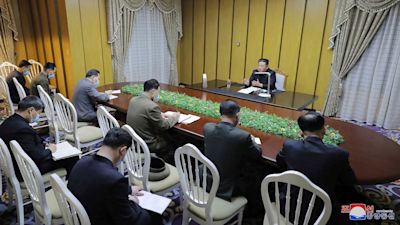North Korea: Six deaths reported after officials admit Covid-19 outbreak

What the country's malnourished population also lack are vaccinations and a decent health care system, reports Asia Correspondent Debi Edward
Six people have died and 350,000 people have been treated for a "fever" that has spread "explosively" across North Korea, according to state media.
It comes a day after the country acknowledged it's first Covid-19 outbreak since the beginning of the pandemic.
A nationwide lockdown was imposed in North Korea on Thursday, with North Korean leader Kim Jong Un pictured wearing a mask for the first time.
One of the six deaths was confirmed to have been infected with the omicron variant, Korean Central News Agency (KCNA) said, but it's not clear how many of the total illnesses were Covid-19.
Of the 350,000 who developed fevers since late April, 162,200 have recovered, the agency said.
On Thursday, 18,000 people were newly found with fever symptoms, and 187,800 people are being isolated for treatment.
“It is the most important challenge and supreme tasks facing our party to reverse the immediate public health crisis situation at an early date, restore the stability of epidemic prevention and protect the health and wellbeing of our people,” KCNA quoted Kim as saying.
Want a quick and expert briefing on the biggest news stories? Listen to our latest podcasts to find out What You Need To Know
North Korea likely doesn’t have sufficient COVID-19 tests and other medical equipment and said it didn’t know the cause of the mass fevers.
But a big COVID-19 outbreak could be devastating in a country with a broken health care system and an unvaccinated, malnourished population.
The crisis could last into 2023 in the poorly-equipped country, according to South Korea’s Sejong Institute analyst Cheong Seong-Chang.
Last year North Korea rejected millions of shots offered by the U.N.-backed COVAX distribution program, including doses of AstraZeneca and China’s Sinovac vaccines.
Some experts believe the state's announcement of its Covid-19 cases indicates a willingness to receive outside aid.
The office of South Korea's new President Yoon Suk Yeol said his government is willing to provide vaccines and other medical supplies to North Korea.
North Korea's other neighbour, China, has also said that it will offer the country help in dealing with the outbreak.
Responding to a question on whether or not the US will supply vaccines to North Korea, White House Press Secretary Jen Psaki said the United States supported international aid efforts but doesn’t plan to share its vaccine supplies with the North.
“We do continue to support international efforts aimed at the provision of critical humanitarian aid to the most vulnerable North Koreans, and this is, of course, a broader part of the DPRK continuing to exploit its own citizens by not accepting this type of aid,” Psaki said Thursday in Washington. “It’s not just vaccines. It’s also a range of humanitarian assistance that could very much help the people and the country and instead they divert resources to build their unlawful nuclear and ballistic missiles programmes.”